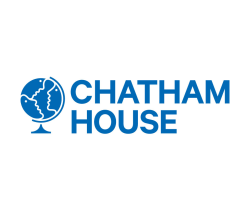
Chatham House is an independent non-governmental organisation whose goal it is to promote international and current affairs. Its mission is to help governments and societies build a sustainably secure, prosperous, and just world through: debating major policy issues with various stakeholders, leading rigorous analysis of critical global, regional, and country-specific challenges and opportunities, and training the next generation of policy influencers to deepen their knowledge of critical policy issues, and to develop their analytical and problem-solving skills.
Through its International Security Programme and the Digital Society Initiative, Chatham House undertakes research and facilitates discussions and exchanges on the policy implications of AI, including in the security and defence fields.
In early 2017, a paper on ‘Artificial Intelligence and the Future of Warfare’ was published to discuss the use of AI in the military context and examine to what extent robots should be allowed to execute such missions, especially if there is a possibility that human life could be at stake. The paper warns that a metaphorical arms race is in progress in the commercial sphere of autonomous systems development, and this shift in research and developments effort and expenditure from military to commercial settings is problematic. This approach could potentially normalise the acceptance of autonomous systems by the military and the public alike, and encourage state militaries to increase their funding for the development of such systems.
Another report published in 2018 further elaborated on the use of AI and the challenges it causes for policymakers. The report explores the impact that AI may have on international affairs, including from military, human, security, and economic perspectives. Several recommendations are outlined, such as: AI expertise must not reside in only a small number of countries; more funds should be allocated to the development and deployment of AI systems with humanitarian goals; clear codes of practice are needed to ensure that the benefits of AI can be shared widely while the risks are well managed.
Another report justifies the use of AI in counter-terrorism and elaborates on the necessary conditions for its legitimate use as part of a predictive approach by liberal democratic states. On the other hand, the report argues that the current way predictive AI capabilities are used presents a number of problems, from both a human rights and a practical perspective. This is especially the case with the use of AI in surveillance activities, which could lead to unlawful infringements of privacy and freedom of expression. In this context, technical and regulatory safeguards could improve compliance with human rights regulations, while also enhancing operational performance of AI systems.
Chatham House runs a project focused on the Policy Implications of Armed Drones Use, with the purpose of fostering dialogue on issues and controversies related to the use of drones (including AI-powered drones) and their policy implications, and providing input in the European debate.
- Explores the impact of AI technology on military operations, warfare, policy-making and international affairs.
- Argues that clear codes of practice are necessary to ensure that the benefits of AI can be shared widely, while its risks are well managed.
- Encourages governments to invest in developing and retaining talent and expertise in AI in order to remain independent.